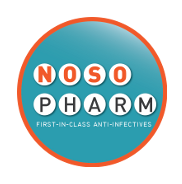Channels
Special Offers & Promotions
Nosopharm Joins European Gram-negative Antibacterial Engine (ENABLE) Project to Combat Antibiotic Resistance
The company aims to advance NOSO-95179, a promising antibacterial compound, to clinical stage for the treatment of multidrug-resistant Gram-negative infections
 Nosopharm, a biotechnology company specialized in the research and development of new antibacterial molecules, today announces it has been selected to join ENABLE (European Gram-negative Antibacterial Engine), a project working to advance the development of potential antibiotics against multidrug resistant Gram-negative infections.
Nosopharm, a biotechnology company specialized in the research and development of new antibacterial molecules, today announces it has been selected to join ENABLE (European Gram-negative Antibacterial Engine), a project working to advance the development of potential antibiotics against multidrug resistant Gram-negative infections.
ENABLE is one of seven projects in the New Drugs For Bad Bugs (ND4BB) consortium, part of the Innovative Medicines Initiative’s (IMI’s) antibiotic resistance program. This €100m ($106m) project aims to identify at least three antibacterial lead molecules with promising antibacterial activity, two antibacterial clinical candidate molecules and to enter at least one compound into preclinical and Phase 1 clinical studies.
Nosopharm will strengthen ENABLE’s R&D portfolio as it brings the most advanced program to date to the project: NOSO-95179, a first-in-class antibiotic for the treatment of multidrug-resistant hospital-acquired infections. Participation in the project will allow Nosopharm to access significant technical expertise and financial support to complete a Phase 1 clinical trial. ENABLE will fund 75% of Nosopharm’s internal R&D costs while the program is active. Nosopharm will also participate in collaborative research with ENABLE’s expert partners across Europe. The project will strengthen the company’s IP as all NOSO-95179 results will be owned by Nosopharm.
Its selection brings encouraging recognition from global anti-infective experts for NOSO-95179 as a promising antibacterial preclinical candidate for the treatment of life-threatening multidrug-resistant Gram-negative infections. Nosopharm will also benefit from the guidance of ENABLE-active members in the European Federation of Pharmaceutical Industries and Associations (EFPIA).
“IMI is delighted that projects such as ENABLE can support SMEs to advance programs through the most challenging phases of development,” said Pierre Meulien, executive director of the Innovative Medicines Initiative (IMI). “This is an example of how public-private partnerships such as IMI can address critical scientific and commercial challenges for the benefit of patients.”
“We welcome Nosopharm’s program into the Innovative Medicines Initiative ENABLE project. We are excited to support SMEs like Nosopharm in this very challenging scientific area,” said Professor Anders Karlén, project coordinator, Uppsala University. “We believe that this collaboration in a public-private partnership context is an excellent way to develop the potential of novel antibacterial agents.”
“Being selected for ENABLE strengthens Nosopharm’s position among the most innovative companies in the antibacterial R&D community,” said Philippe Villain-Guillot, president of Nosopharm. “This is a major milestone in the development of our NOSO-95179 candidate. We aim to start IND-enabling studies in 2018 and launch our first-in-man clinical trial in 2019. We would like to warmly thank the IMI and the ENABLE team for their trust and support.”
Hospital pathogens with multiple antibiotic resistances are responsible for at least 380,000 infections and 25,000 directly related deaths per year in the European Union[1]. The annual treatment and social costs have been estimated at some €1.5 billion ($1.59bn). From a global perspective, antimicrobial resistance could kill up to 10m people every year by 2050 and could cost $100 trillion (€94tn) to the world economy[2]. In 2013, 21% of Klebsiella pneumoniae strains in the European Union had combined resistance to cephalosporins, aminoglycosides and fluoroquinolones (+38% compared to 2010) and 18% of Pseudomonas aeruginosa strains were resistant to carbapenems (+4% compared to 2010).
Media Partners


